Are you a warehouse or commercial property owner in Windsor, Chatham, Sarnia or the surrounding Southwestern Ontario area? If so, you may have experienced some difficulty finding what works best for your warehouse flooring. Durability and safety are essential elements of any functional workspace, but there’s so much more to consider when it comes to epoxy warehouse flooring. Color schemes, materials, installation processes—it all matters in terms of quality. But if you’re like most people, you may find that making the best decision when it comes to selecting commercial epoxy floor coatings is a little daunting.
At Canadian Concrete Services, we understand this dilemma and have years of expertise in helping our clients choose the best solutions for commercial warehouses. Not to mention that customer satisfaction is our top priority. In this blog post, we provide essential information regarding epoxy floors so that you can make confident choices about what kind of surface is right for your facility.
Read on for expert insights into choosing and installing epoxy floors in Windsor warehouses.
What Is The Best Flooring For A Warehouse?
When it comes to warehouse flooring, there are many types of floors that can be applied. Concrete, asphalt, vinyl, and epoxy are all viable options. However, epoxy flooring or polished concrete is an excellent choice, especially for an industrial space. This type of floor coating has a few distinct advantages over other types of surfaces for a warehouse setting.
Asphalt: This material is low-cost and provides a dependable, durable surface. However, asphalt can be prone to cracking or staining over time and needs to be replaced periodically. Although this flooring option isn’t seen very often indoors.
Vinyl: Vinyl flooring is affordable and comes in a variety of colors and textures, making it an attractive solution for many warehouses. However, vinyl can easily become damaged and can be slippery when wet. In terms of durability its a low grade option.
Polished Concrete: Polished concrete is a good option for warehouse flooring, as it is highly durable and easy to maintain. However, industrial polished concrete can be difficult to repair or patch and often needs to be replaced or repaired in large areas if damage occurs. Usually due to its extreme durability, polished concrete repairs are rarely needed.
Epoxy: This is one of the most popular options as it provides superior protection from wear and tear. It is both, stain resistant and waterproof and offers enhanced traction for employees who are walking on the surface. When applied correctly and properly maintained, a commercial epoxy coating can last up to 10 years or more. These coatings also provide a great aesthetic when applying bold color schemes that can help your facility stand out.
Pros of Using Epoxy Floor Coatings for Warehouse
Epoxy floor coatings are often the preferred choice for warehouse flooring due to their many advantages. The epoxy coating provides a high level of resistance to stains, corrosion, and abrasion that is greater than other types of floor coverings. This means your facility floor will have a much longer life span with an epoxy coating.
Durable
Epoxy floors are incredibly durable and can withstand heavy foot traffic, forklifts, and other machinery in the warehouse. The surface is water-resistant and is also resistant to chemical spills and harsh cleaning solutions that are necessary for a commercial environment.
Epoxy is durable because it creates a monolithic bond with the concrete substrate. This means that if the concrete cracks, the epoxy will move and flex to accommodate it without breaking.
Easy to customize
Epoxy floor coatings offer a wide range of decorative options. Because the epoxy comes in many different colors and can be customized to beautiful effects like flake flooring, geometric patterns, and logos.
Cost-effective
Installing commercial epoxy coatings is generally more cost-effective than other flooring methods. The installation process often requires minimal disruption and downtime when compared with other forms of floor coverings such as carpet, tile, or wood floors.
Cons of Epoxy Coating for Warehouse Floor
Although epoxy flooring solutions offer many advantages, there are also a few drawbacks that should be considered before investing in this type of coating.
Strong application fumes
When epoxy coatings are applied, a strong chemical odor is released that can linger in the air long after the application is complete. This may make it difficult to work in your warehouse until all the fumes have dispersed.
Long curing time
Epoxy coatings require a long curing time in order to reach their full strength. This means that your warehouse may be out of use for a period of time while the epoxy is setting and drying.
Slippery when wet
Epoxy flooring can become slippery when it gets wet, which can be a safety hazard in some cases. It is important to take the necessary precautions such as applying a non-slip coating or using proper matting to increase traction on the surface.
Quality Installation Process: Steps to Your Warehouse Epoxy Flooring Installation
Installing epoxy flooring in a warehouse or garage floor requires precision and attention to detail, so it is important to hire the services of an experienced professional. Here are the steps involved in a quality epoxy installation:
Step 1 – Preparing the flooring surface
The first step in the epoxy application process is to properly prepare the flooring surface. This includes the following:
- Remove existing coating: The existing coating must be completely removed and any debris cleaned up before the epoxy can be applied.
- Clean and fill cracks or holes: The surface should be thoroughly cleaned and any cracks or holes filled with a patching compound to ensure proper adhesion of the epoxy coating.
- Apply primer-sealer: A primer sealer should be applied to help ensure that the epoxy adheres properly to the flooring surface.
Step 2 – Repairing existing damage
If the surface is damaged, it is important to repair any cracks, chips, or holes before applying the epoxy coating. This will ensure a seamless and even finish when the epoxy has been applied. This step includes:
- Inspect the surface: The surface should be inspected to identify any existing damage or imperfections.
- Fill any holes or cracks: Any holes or cracks should be filled using a patching compound that is designed for use with epoxy coatings.
- Sand and smooth surface: The area should then be sanded and smoothed in order to get rid of any bumps, divots, or ridges on the flooring surface.
Step 3 – Applying the base coat
The base coat is the first layer of epoxy that is applied to the floor. This coat will provide a foundation for the other layers and set the tone for the finished product. This step includes:
- Mix the epoxy: The epoxy should be properly mixed in accordance with manufacturer instructions.
- Apply base coat: The base coat should be applied in an even layer over the entire surface and allowed to dry before proceeding to the next step.
Step 4 – Applying the top coating
The top coat is the final layer of epoxy that is applied to the floor. This layer will provide a protective barrier against stains and wear, it is chemical resistant, and gives the surface its desired finish. These steps include:
- Mix the top coat: The top coat should be properly mixed in accordance with manufacturer instructions.
- Apply top coat: The top coat should be applied in an even layer over the entire surface and allowed to dry before proceeding to the next step.
- Allow the epoxy to cure: Epoxy needs a long curing time in order to reach its full strength and durability.
- Seal epoxy: Once the epoxy has cured, a sealer can be applied to provide further protection and enhance the appearance of the finished product.
FAQs: Epoxy Warehouse Flooring
Here are some frequently asked questions about epoxy flooring:
Is epoxy flooring cheaper than tile?
Yes, epoxy flooring is generally more cost-effective than tile. But this depends on the quality and finishes of both epoxy and tiles. The installation process is often simpler, requiring minimal disruption and downtime.
What kind of maintenance is required for epoxy warehouse flooring?
Epoxy warehouse flooring requires minimal maintenance. To keep the surface clean, regularly sweep away debris and use a damp mop or cloth to wipe any spills or dirt. Avoid using harsh cleaning products as they can damage the epoxy coating. It is also important to inspect the floor regularly for signs of wear and tear, such as cracks or chips in the coating.
Are there any hazards associated with epoxy warehouse flooring?
Yes, epoxy flooring can become slippery when wet, so it is important to take the necessary precautions such as applying a non-slip coating or using matting to increase traction on the surface. Additionally, epoxy coatings are applied with strong chemical odors that may linger in the air for some time after application. Make sure to open windows and ventilate your workspace until the fumes have dissipated.
Canadian Concrete Surfaces: Your Epoxy Warehouse Flooring Experts in Windsor
To conclude, epoxy warehouse flooring is an ideal choice for many warehouses due to its durability, slip resistance, and cost-effectiveness. Although there are some drawbacks to using epoxy coatings, such as its strong application fumes, long curing time, and potential to become slippery when wet, a quality installation process will ensure that your warehouse flooring looks great and lasts for years to come.
Canadian Concrete Surfaces has the expertise to answer any questions you may have about epoxy warehouse flooring in Windsor, including its cost-effectiveness in comparison to alternative flooring options, its maintenance, and how to mitigate the hazards associated with its use. Canadian Concrete Surfaces’ experienced staff are well educated on the latest technology in epoxy coatings and how to correctly install your new floors. With us on your side, you can be sure your finished project will be one of quality and excellence. So don’t hesitate to contact Canadian Concrete Surfaces today for your perfect epoxy warehouse project.

Devon has over 25 years of experience providing customers with high performance epoxy flooring to fit any need or budget. Referrals are our best friend and customer satisfaction is always our top priority. When Devon is not working you can find him fishing, or hunting across North America.
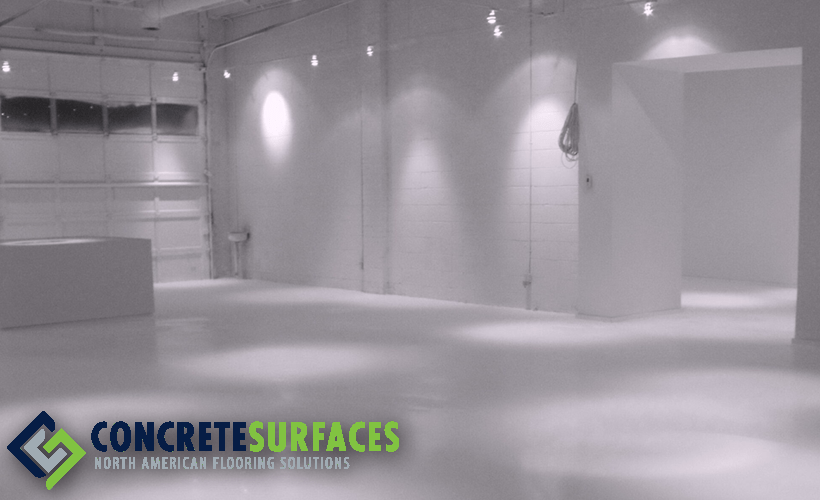


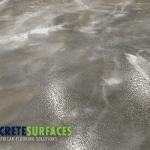
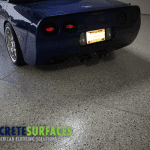
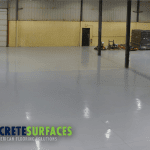
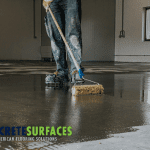
Share This Article
Choose Your Platform: Facebook Twitter Google Plus Linkedin